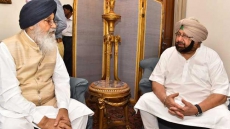Prime Minister Narendra Modi on Tuesday announced a hike in the monthly honorarium of accredited social health activists (Ashas) and Anganwadi workers. There are over 24 lakh of them, mainly women, who attend to health and nutrition needs of mostly women and children.
The announcement of doubling of remuneration — made during the PM’s interaction with Anganwadi, ANMs (auxiliary nurse midwives) and Asha workers over video-conferencing on Tuesday — will take the minimum money an ASHA worker makes every month from Rs 1,000 to Rs 2,000.
Anganwadis who now draw an honorarium of Rs 3,000 will get Rs 4,500, and those who get Rs 2,200 will get Rs 3,500.
The monthly honorarium of Anganwadi helpers will go up from Rs 1,500 to Rs 2,500.
The revision will come into effect from October 1 — the PM called it their “Diwali gift.”
All Asha workers will also be brought under the coverage of various social security schemes and will get Rs 2-lakh free insurance cover under Pradhan Mantri Jeevan Jyoti Bima Yojana and Prime Minister Suraksha Bima Yojana.
BJP president Amit Shah and RSS affiliated trade union Bharatiya Mazdoor Sangh (BMS) applauded Prime Minister’s announcement on the long pending demand.
“Congratulate (Prime Minister) Narendra Modi on the historic decision doubling of the honorarium for Asha workers and unprecedented hike in honorarium for anganwadi workers coupled with Rs 2 lakh worth of protection,” Shah tweeted saying it will not only boost the morale of workers but also help upgrade their services.
“This historic decision by Prime Minister will benefit about 27 lakh Anganwadi and 12 lakh Asha workers across the country. Our heartiest congratulations to Prime Minister Narendra Modi for this,” said Virjesh Upadhyay, General Secretary of BMS, adding that it had been agitating for this demand since November 2014.
At present, an Asha worker makes Rs 1,000 as the basic amount for routine work like updating registers, etc, even if she does not see any patient in a given month. From November 1, that amount will be Rs 2,000.
Over and above this, is the incentive that Ashas get for vaccinations, prenatal checks, institutional deliveries, among other functions.
Sources in the Health Ministry said that monthly remuneration is shared between the Centre and states in a 60:40 ratio, as is the norm for all payments under the National Health Mission. The expenditure incurred by the Centre for the salary component of 10.22 lakh Ashas is Rs 800 crore. For states, the expense comes to approximately Rs 533 crore.
Anganwadi workers fall under the Integrated Child Development Services (ICDS) programme administered by the Women and Child Development (WCD) Ministry. The WCD Ministry’s rough estimates suggest that the Centre will pick up the tab of Rs 3,000 crore for the enhanced payments to Anganwadi workers. For states, at the same 60:40 ratio, the annual increase in expenditure will be an estimated Rs 2,000 crore, the ministry has calculated.
As for the premium for the two insurance programmes, these will be paid entirely by the Centre.
The annual premium for Suraksha Bima Yojana is Rs 330 and that for PM Jeevan Jyoti Yojana is Rs 12.
During his interaction, which is a part of the Rashtriya Poshan Maah celebrations, Modi said that PM Jan Arogya Yojana, the Rs 5-lakh health cover programme for 10.74 crore families, will be launched from Jharkhand on September 23 and the beneficiaries have already been identified.
Highlighting the link between health and growth of the country, the Prime Minister said if children are weak then the nation’s growth would also slow down. Taking examples from India’s performance at the recent Asian Games, he said it was the hard work of frontline health workers that had ensured that children born of poor parents turned out to be champions.
He asked Asha and Anganwadi workers from Nandurbar, a district in northwest Maharashtra bordering Gujarat, whether a tea stall that he once frequented once is still up and running.




